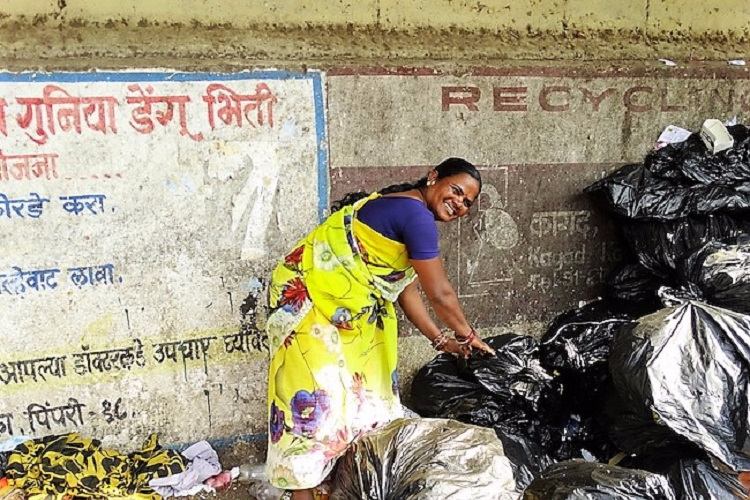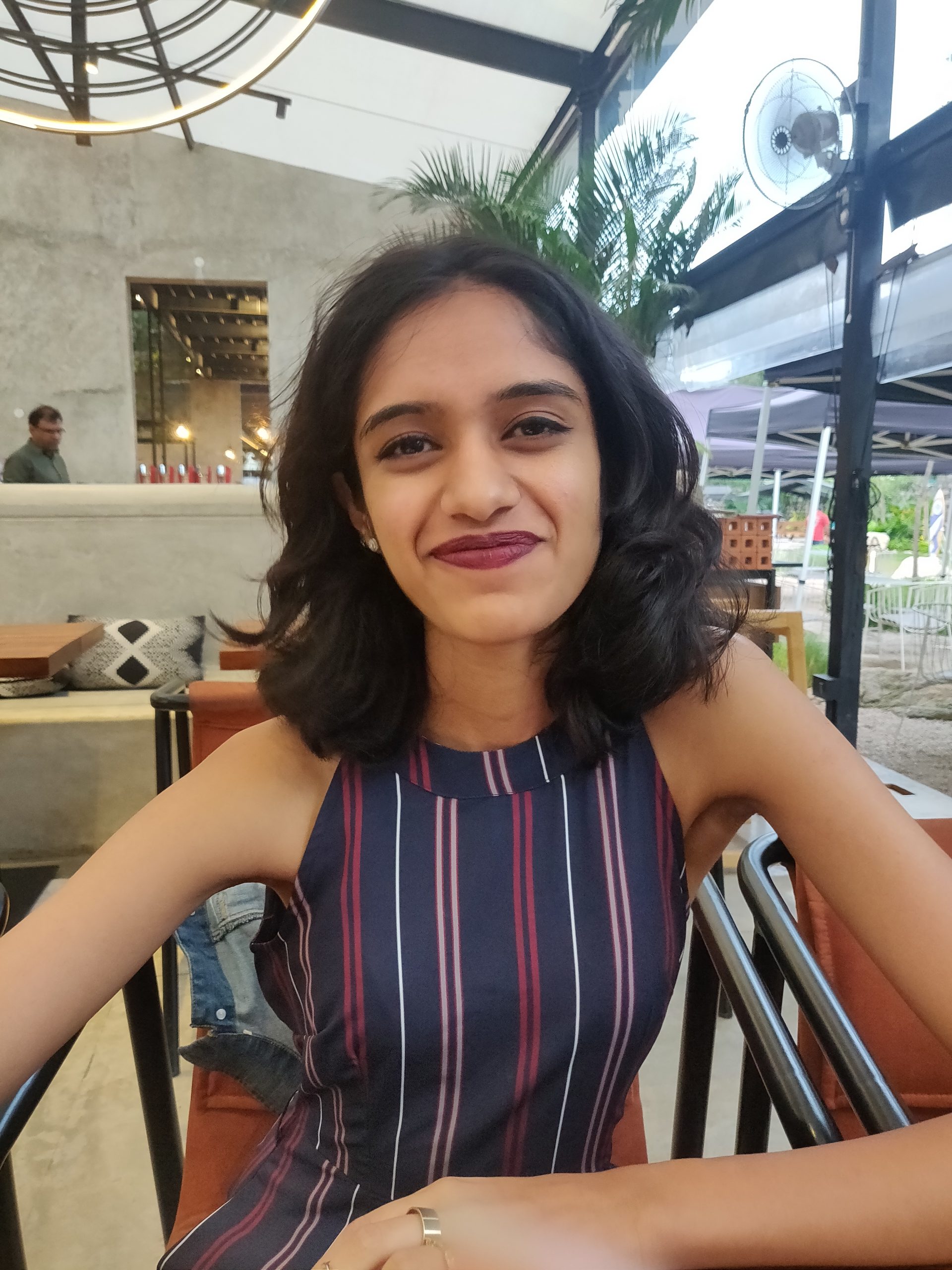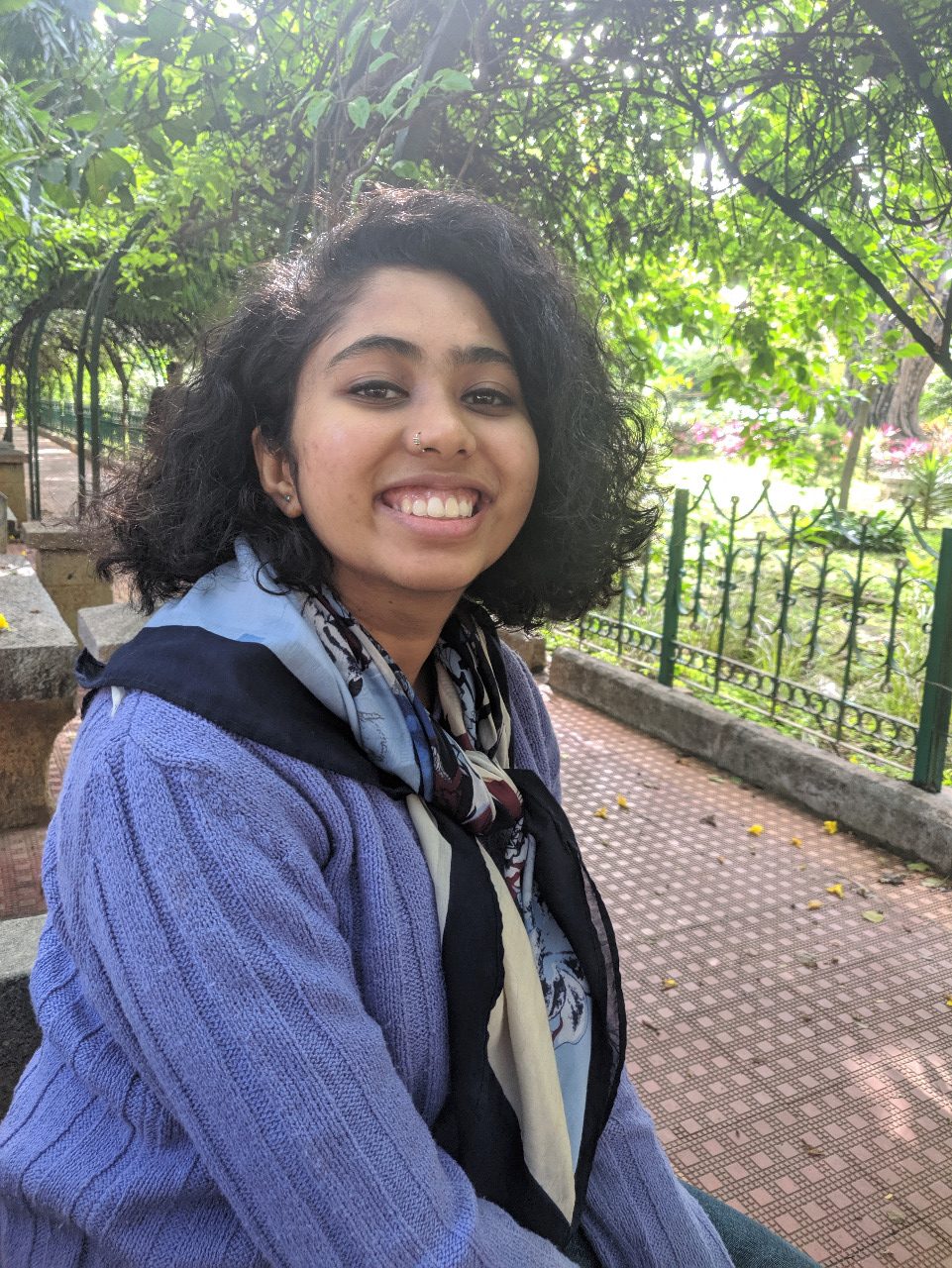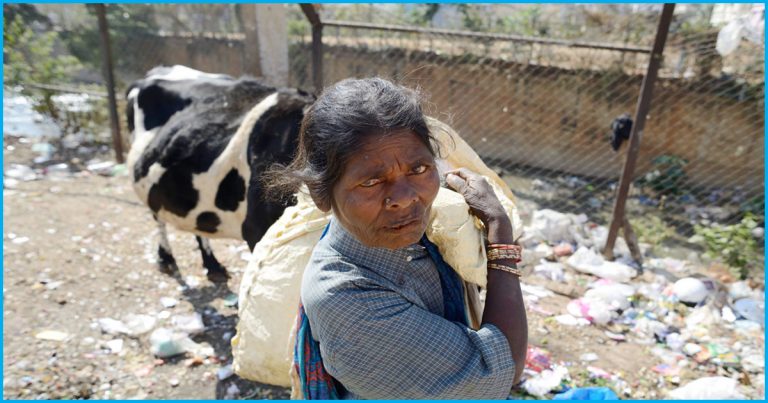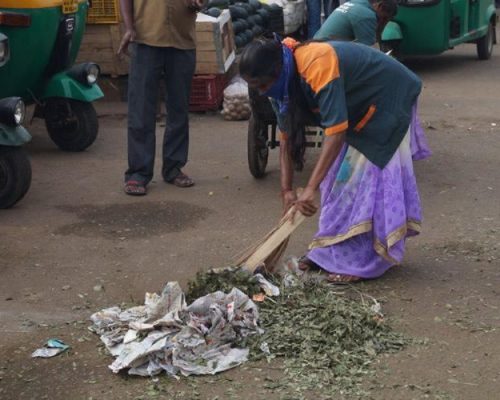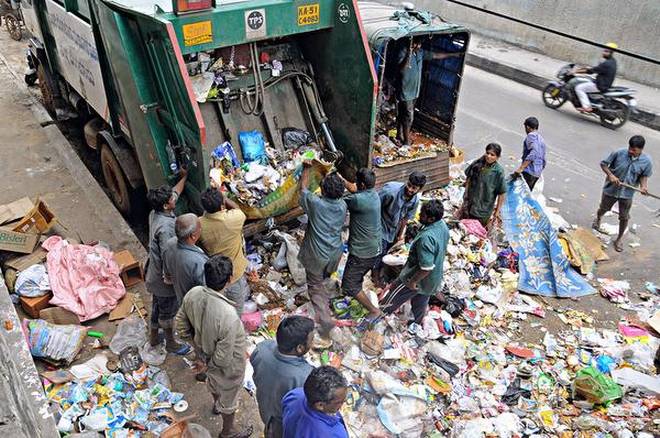How Decentralised Solid Waste Management can help in addressing Climate Injustice: A Case Study of Pourakarmikas in Bengaluru
In the article ‘Why Decentralised Solid Waste Management is Key for Climate Mitigation and Adaptation’, the author wrote about the importance of advocating for decentralised solid waste management (SWM) in Indian cities. Multiple public health, safety and environmental co-benefits arise from effective waste management practices which concurrently reduce GHG emissions and improve the quality of life, promote public health, prevent water and soil contamination and conserve natural resources. The author also argued that any conversation about solid waste management is incomplete and unjustified without addressing the caste, class and gender dimensions of the topic. There is an evident dearth of literature when it comes to the negative effects of climate change borne by sanitation workers in India and how caste-bias deepen these effects. Through this article, we explore these linkages in the context of the Pourakarmikas in Bengaluru and propose decentralised SWM as the first step in addressing the increasing injustices meted to them. Although this paper is about the Pourakarmikas in Bengaluru, the observations made by the authors can be extended to the waste pickers in cities across India. Therefore, this article is a contribution to the efforts to bridge this research gap.
In every Indian city, it is largely Dalit women, women from scheduled castes and lower socio-economic groups who are employed or contracted as waste collection workers by the local municipalities or private contractors respectively. In Bengaluru, they are known as Pourakarmikas. Called the ‘green army’ of the city, they are tasked with clearing of garbage, waste-picking and cleaning of streets, with their shifts starting as early as 6:30 A.M. and stretching till 02.00 P.M. The ‘Socio-Economic Profile of Pourakarmikas’ revealed that men make up 53.33% of the total number of workers, while women comprise the rest 46.67%. In terms of caste composition, the predominant share of Pourakarmikas belonged to the Scheduled Castes, while a meagre 3.3% were from the general category. 7% and 7.3% hailed from Schedule Tribes and Other Backward Classes respectively. This suggests that caste is definitely a visible presence in sanitation practices in cities in urban India. Additionally, due to caste structures, some of them have been working for nearly two decades, and have no experience except this and cannot afford to shift jobs.
Despite them forming the core of Bengaluru’s vast waste management network and being important civic workers, the municipal body’s apathy towards them is palpable. These workers, who have been hired on contract-basis, are often not registered on BBMP’s payrolls due to middle-men such as contractors. Although their numbers are in thousands, many Pourakarmikas are not recognised and their labour goes unaccounted for in this contract system. As a result, Pourakarmikas face close to no occupational, work and social security, thus making them susceptible to a multitude of risks in the background of the climate crisis and the ongoing COVID-19 pandemic. Countless protests by the workers’ body have gone unheard, including their recent demands for PPE kits to avert COVID-19 transmission in their line of work. A recent survey of 20 wards done by Environment Support Group observes that the situation towards the working conditions of the Pourakarmikas remains apathetic. An article in The Quint mentions that despite being essential workers, Pourakarmikas in the city have not received any transportation allowance, toilet/water/food facilities and no mass testing has happened . Absence of safety gear, sick leave and medical benefits spell unfavourable working conditions for the Pourakarmikas, and this has led to the demise of five Pourakarmikas as of July 17, 2020 .This is in clear violation of the directions issued by the Ministry of Social Justice and Empowerment, Government of India, dated 20th April, 2020. Therefore, the intersection of their marginalised identities and the various hazards of their occupation make Pourakarmikas an extremely vulnerable population. With environmental and public health risks only seeming to increase in the near future due to climate change, it is important to make a vehement and conscious effort to identify and address the linkages between caste, class & gender identities with climate change injustices.
Climate Crisis and Pourakarmikas
The IPCC AR5 WGII (2014) report notes that socially and geographically disadvantaged people – including people facing discrimination based on gender, age, race, class, caste, indigeneity and disability – are particularly affected negatively by climate hazards. Thus, Pourakarmikas are at the forefront of the climate crisis. As one of Bengaluru’s most essential workers, their exposure to the risks of climate change is significant. Extreme weather events that are becoming more frequent as a result of climate change, reinforce the long-standing inequalities of caste, class and gender in a severe manner. This coupled with the harsher working conditions that climate change inevitably brings with it, the brittle status of the Pourakarmikas is predicted to only worsen. A working paper by DESA shows that disadvantaged communities are the most susceptible to the climate crisis due to 3 main reasons. One, the increase in the exposure of disadvantaged groups to the adverse effects of climate change. Two, the increase in their susceptibility to damage caused by climate change. And three, decrease in their ability to cope and recover from the damage suffered. This holds true in the case of the Pourakarmikas as well.
As waste pickers, Pourakarmikas are exposed to the adverse effects of climate change. Bengaluru has witnessed a sharp increase in temperature in the last two decades as a result of declining green cover and extreme vehicular pollution. This along with erratic weather patterns like undue rains, that precede even the pre monsoon showers, is clear evidence of climate change and environmental degradation in Bengaluru. The nature of Pourakarmikas’ occupation demands them to work outdoors for long hours under the harsh and ever changing weather conditions as described above. They are also made to work with poor quality and unscientific protective gear while handling toxic and hazardous materials that increases their exposure to the adverse effects of climate change.
Pourakarmikas are also susceptible to the damaging effects caused by climate change. One of the important ways in which caste-based occupational discrimination and inequality increase the susceptibility of the disadvantaged groups to damages caused by climate change is through effects on health. The ‘Socio-Economic Profile of the Pourakarmikas’ states due to the nature of their work and the lack of protective equipment, Pourakarmikas are at the risk of contracting numerous diseases. Tuberculosis, respiratory allergies, nutritional issues, diabetes, arthritis, diarrheal diseases, skin problems, asthma, gynecological diseases and cancer are some of the diseases that Pourakarmikas are commonly prone to. Apart from physical health, the generational inequality and discrimination faced by Pourakarmikas also makes them susceptable to various mental health issues that are unfortunately not as widely studied. Many Pourakarmikas also face tobacco and alcohol addiction issues. These existing health conditions are exacerbated with increased exposure to heatwaves, pollutants and erratic weather patterns, all symptoms of climate change.
Pourakarmikas also have a decreased ability to cope and recover from the damage suffered during the climate crisis. To rephrase, they have reduced access to facilities that would enable coping and recovering due to generations of caste and class based discrimination. As previously discussed, Pourakarmikas are susceptible to the damaging effects of climate change and have increased exposure to its adverse effects. Access to health care, health insurance, safety equipment, toilet and sanitation facilities is largely absent. Pourakarmikas often do not get paid sick leaves and even if they do take a day off, they are faced with the threat of unemployment. Basic nutrition, required medications, regular meals and many more facilities for good immunity that privileged people in the city consider as a necessity, especially during the pandemic, are sadly absent from the daily lives of the Pourakarmikas. It is also a well-known fact that their life spans are well below the national average. This reduces their ability to cope and physically recover from the damage suffered during the climate crisis.
What we see in the case of the Pourakarmikas, and waste workers at large, is generational and continued inequality. There are also direct and indirect injustices that arise due to climate change. These injustices follow a vicious cycle that must be broken to ensure climate justice and labour equality. One way in which we propose this vicious cycle of climate injustice faced by Pourakarmikas is broken, or at the least, addressed, is through decentralised SWM.
Decentralised SWM as a way forward
During an interview with the authors, Kathyini Chamraj, independent journalist and executive trustee of CIVIC, an NGO working towards decentralisation, urban governance and citizen participation stated that as per the National Urban Livelihood Mission, Pourakarmikas can be formed into self-help groups and be directed to carry out local processing of waste. “Instead of outsourcing it to contractors with vested interests, the existing PKs can be segregated into groups and be tasked with the collection and processing of waste”, proposes Kathyini. This promotes independence in labour and socio-economic benefits that SHGs bring with them. She notes that there are already existing SHGs in Mahadevapura and RR Nagar, but BBMP insists that they bring their own vehicles. SHGs of women are unable to afford vehicles, and hence remain in the clutches of contractors with vehicles.
Kathyayini also claims that the civic administration is against decentralised waste segregation as it costs them their commission. “They did not want the local processing to happen, otherwise the transportation would stop – the farther BBMP contractors transport waste out of the ward, the more money the councillors get” she said, adding that the councillors seek mixed and unsegregated waste, as it increases the volume or weight of the garbage which is more valuable. This incentivises them to transport more and more waste further away rather than localised management which would solve the problem of landfills. Additionally, transportation of solid waste in open trucks is a climate hazard, something the administration has failed to recognise.
Local processing can help stall climate change as not only are we halting transportation, but the biogas that can be created out of the organic compost and community processing of waste creates a scale of efficiency. During an interview with Kathyayini, she also recounts when NGOs encouraging waste segregation in apartment complexes were threatened by the henchmen of these contractors. Elaborating on the ruling of the Safai Karmachari Commission, Kathyayini says the BBMP were warned to not outsource waste management and disposal to external contractors. “Owing to the profitable nature, the civic body does not want to lose out on the nexus between the contractors and councillors” she says. “As per a Karnataka HC order, ward committees were mandated to meet by November 30, 2017 and formulate an action plan for identifying land for local processing of waste and submit it to the BBMP Commissioner and the Court.” She says despite the order, over 75% ward committees failed to meet or prepare action plans that were supposed to be displayed on the civic administration’s website. The Court’s focus since has however shifted to waste management rather than the committees’ role in it.
Flagging the lack of political will and deficiency of the current physical waste infrastructure, BBMP is shifting the onus of waste management and processing on citizens, urging them to start composting at home; but failing to utilize the resources at its disposal. She also talks about the ambiguity of BBMP notices or circulars, for which the PKs pay the price. “They specify that masks, brooms and gloves should be provided to the Pourakarmikas; but it doesn’t specify how often these have to be provided” she says, noting that contractors provide these equipment in the beginning of the contract and will not replace the batch for the next three years. Thus, the PKs are forced to buy them out of their own pocket, or do without it.
So what can we do?
As citizens of Bengaluru who benefit immensely from the work performed by Pourakarmikas, we have a tremendous amount of work to do to help better working conditions and call for environmental and social justice. One, we must pass on the mic to unions and Pourakarmikas themselves who work tirelessly to fight for their right. All India Central Council for Trade Unions (AICCTU) regularly conducts monthly review meetings, holds protests and is extremely active in advocating for the change in Pourakarmikas working conditions and in demanding better and regular pay. Two, according to Kathyayini, Resident Welfare Associations are doing good work in educating citizens about SWM in Bengaluru. However, she mentions that the work must not end there and it should be carried into actively participating in ward committee meetings and demanding the right kind of infrastructure for managing solid waste in Bengaluru. Research must be done by citizens on infrastructure that exist in other Indian cities such as Allepy, Trivandrum and Indore, that enable decentralised SWM. Citizens must put pressure on authorities to invest in the right infrastructure that will result in a turn around in the working conditions of Pourakarmikas. Three, Kathyayini mentions that citizens must also unite towards accepting plans, albeit they are scientifically and legally made, that ward committees come up with in regards to setting up of waste management centers. Citizens must vehemently demand that these centers function in a scientific and rule adhering manner. If done so, then there will be no stink and no negative externalities in the physical environment of having such waste collection centers. Four, citizens can demand sustainable solutions to different urban problems that are interlinked. For example, Kathyayani suggests that biogas that is created from biomethanation be used to fuel BMTC last mile connectivity vehicles and feeder buses. It can also be converted to electricity and used to power electric vehicles. Investment in this is much more sustainable than investing in large and inherently unjust infrastructure in cities such as elevated corridors and flyovers that contribute to the problem of pollution and climate change. Five, we must put pressure towards changing the very system of SWM in Bangalore from a vicious and unjust profit market that benefits upper caste folks in society to one of equity and justice that incorporates ethical working conditions of Pourakarmikas. In the existing system, Pourakarmikas will remain the most affected for no fault of theirs. Six, we must advocate for climate action being written into our labour laws. With a heating word and the stress it puts on those who toil under horrible working conditions as a result of the unjust caste system, a rewrite of the labour laws is essential while also fighting for an anti-caste society.
ABOUT THE AUTHORs
Pragathi
Ravi
If you wish to get in touch with the author of the article, you can email her at :
[email protected]
Pragathi Ravi is a Bengaluru-based freelance journalist who writes on gender, social justice, urban governance and mobility. She tweets at pragathi_r24.
sahana subramanian
If you wish to get in touch with the author of the article, you can email her at:
[email protected]

